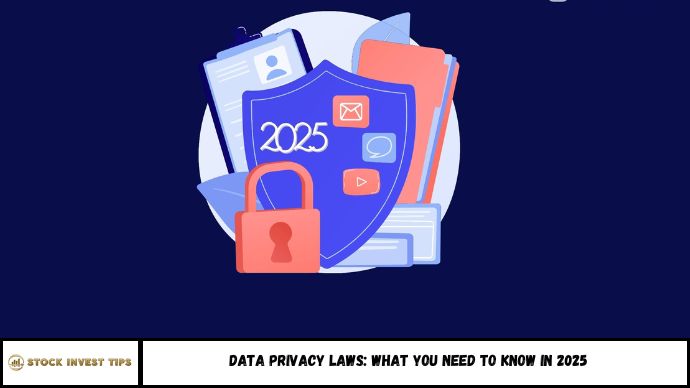Data privacy laws in 2025 have become stricter and more complex as governments respond to rising cyber threats and public demand for transparency. This article outlines major updates to global privacy regulations, what they mean for businesses and individuals, and how to stay compliant. With enforcement on the rise, understanding these laws is critical to avoid fines and maintain trust.
Is Your Data Privacy Strategy Ready for 2025?
In March 2025, a U.S.-based tech company was fined $48 million by the European Union for violating newly updated GDPR rules. The reason? Their privacy policy hadn’t been updated in two years, and user data was being collected without proper consent.
As more personal and organizational data flows through the internet every second, regulators around the world are strengthening laws to protect it. The risk of non-compliance is higher than ever. Whether you’re running a business or managing your digital footprint, understanding the latest data privacy laws is essential.
This article will explain:
- The most significant global privacy law updates in 2025
- What changes mean for individuals and businesses
- How to remain compliant and protect your data
- Steps to build a sustainable data protection strategy
Why Data Privacy Laws Are Evolving in 2025
Cybercrime and Public Concern Are Increasing
- According to IBM’s 2024 Cost of a Data Breach Report, the average breach cost reached $4.96 million.
- A 2025 PwC survey found that 73% of consumers are more cautious about how companies handle their data than ever before.
Governments Are Expanding Legal Protections
New and revised laws focus on:
- Broader definitions of personal data
- Shorter breach notification timelines
- Stricter penalties for non-compliance
Major Data Privacy Laws to Know in 2025
1. GDPR (European Union)
- Now includes biometric, behavioral, and inferred data.
- Mandatory breach notification within 24 hours.
- Maximum fines increased to €25 million or 6% of global revenue.
2. CCPA and CPRA (California, USA)
- Expanded scope includes mid-sized companies with data on over 50,000 users.
- Consumers now have the right to opt out of AI profiling.
- Enforcement authority expanded through the California Privacy Protection Agency.
3. DPDP Act (India)
- Enforced from July 2024.
- Requires explicit, informed consent before processing personal data.
- Global companies handling Indian data must appoint a local Data Protection Officer (DPO).
4. PIPL (China)
- Introduces stricter data localization and cross-border data transfer restrictions.
- Heavier penalties for repeated violations, including business license revocation.
5. Emerging Legislation (Canada, Brazil, ASEAN)
- Brazil updates LGPD to align more closely with GDPR.
- Canada’s Consumer Privacy Protection Act (CPPA) takes effect late 2025.
- ASEAN members advance toward regional data standardization under the ASEAN Digital Privacy Regulation (ADPR).
What These Laws Mean for Businesses and Individuals
For Businesses:
- Review and update data collection and storage practices.
- Ensure all user data is processed with clear, documented consent.
- Appoint a DPO or work with external consultants for compliance oversight.
- Update privacy policies and cookie banners to reflect new requirements.
For Individuals:
- Exercise your rights to access, correct, or delete your personal data.
- Be cautious about apps or platforms requesting excessive permissions.
- Monitor for updates in privacy settings, especially with AI-powered tools.
Best Practices to Stay Compliant in 2025
1. Conduct Regular Data Privacy Audits
Identify what data is collected, how it’s used, and who has access.
2. Update Privacy Policies and Consent Mechanisms
Make sure they align with the latest laws and are easy for users to understand.
3. Train Staff on Data Protection Responsibilities
Regular training ensures employees understand how to handle personal data and respond to incidents.
4. Minimize Data Collection
Only gather the information necessary to provide your service.
5. Implement Technical Safeguards
Use encryption, secure cloud services, and multi-factor authentication.
FAQs
1. What is the biggest data privacy law update in 2025?
The expansion of what qualifies as personal data and stricter breach notification timelines, especially under GDPR and CCPA.
2. Do small businesses need to comply with these laws?
Yes. Many new rules apply to businesses of all sizes if they collect personal data or operate in regulated regions.
3. What are the penalties for non-compliance?
Fines can reach millions of dollars and may include business restrictions or shutdowns for repeat violations.
4. Are AI and profiling regulated under new laws?
Yes. Consumers now have rights to opt out of AI profiling under laws like CCPA and GDPR.
5. Can individuals request deletion of their data?
Yes. Most major laws include data deletion (right to be forgotten) as a user right.
6. How can I tell if my business is compliant?
Conduct a privacy audit, review your data policies, and seek professional guidance if necessary.
Conclusion
As data privacy regulations become more complex and globally enforced, the time to act is now. Whether you’re managing a business or safeguarding your own information, understanding the legal landscape is crucial.
- Audit your systems regularly
- Train your team
- Implement secure practices
- Stay informed on legal changes
Data privacy is not just about compliance—it’s about trust, responsibility, and resilience in the digital age.

